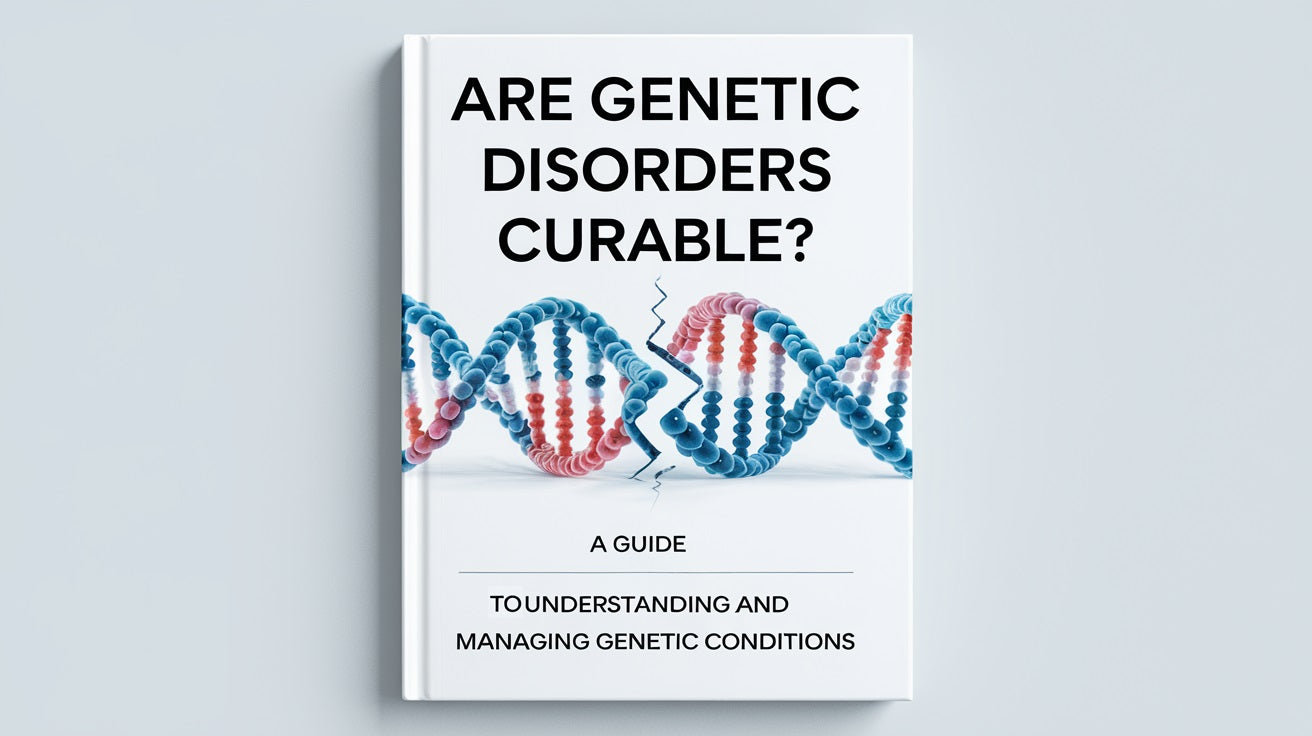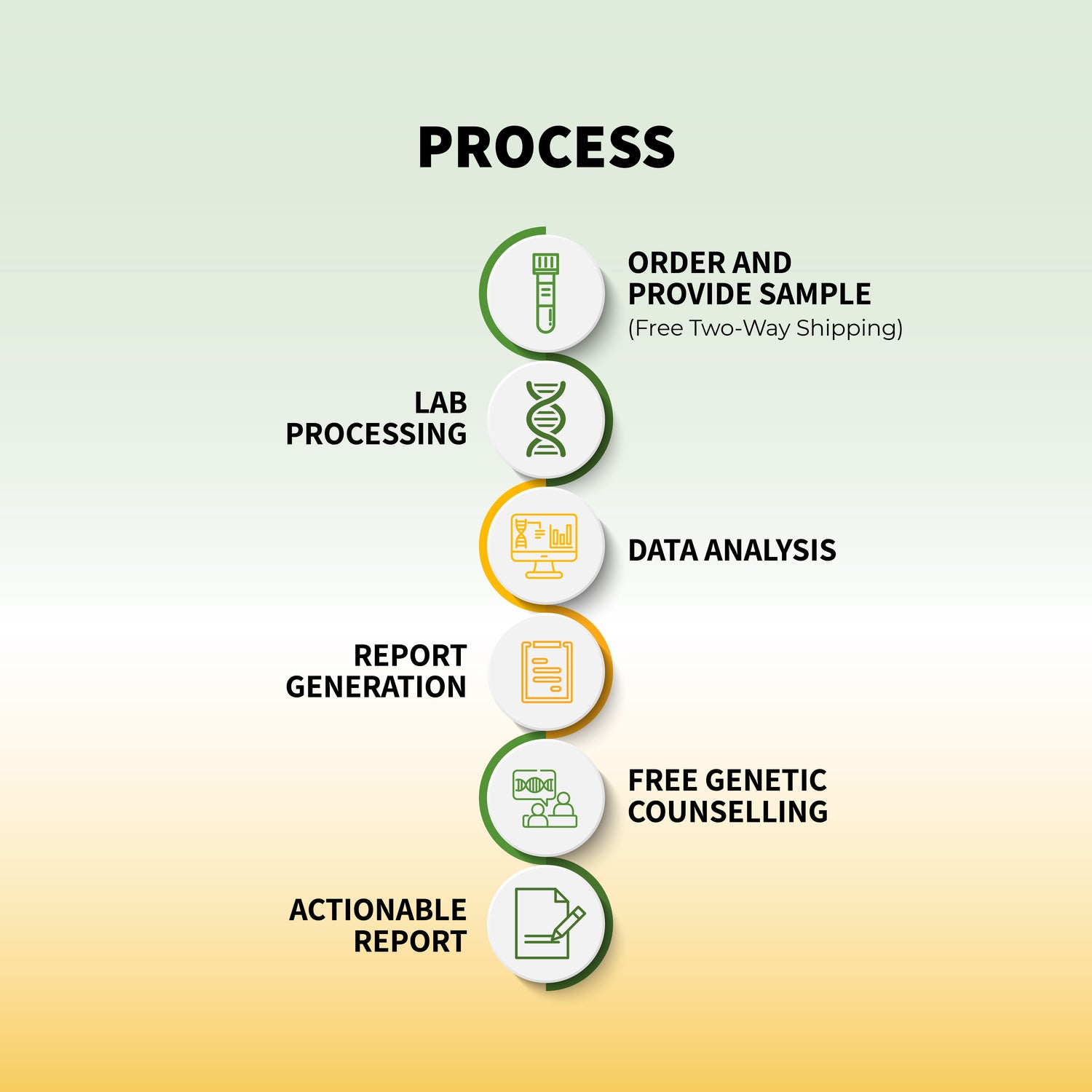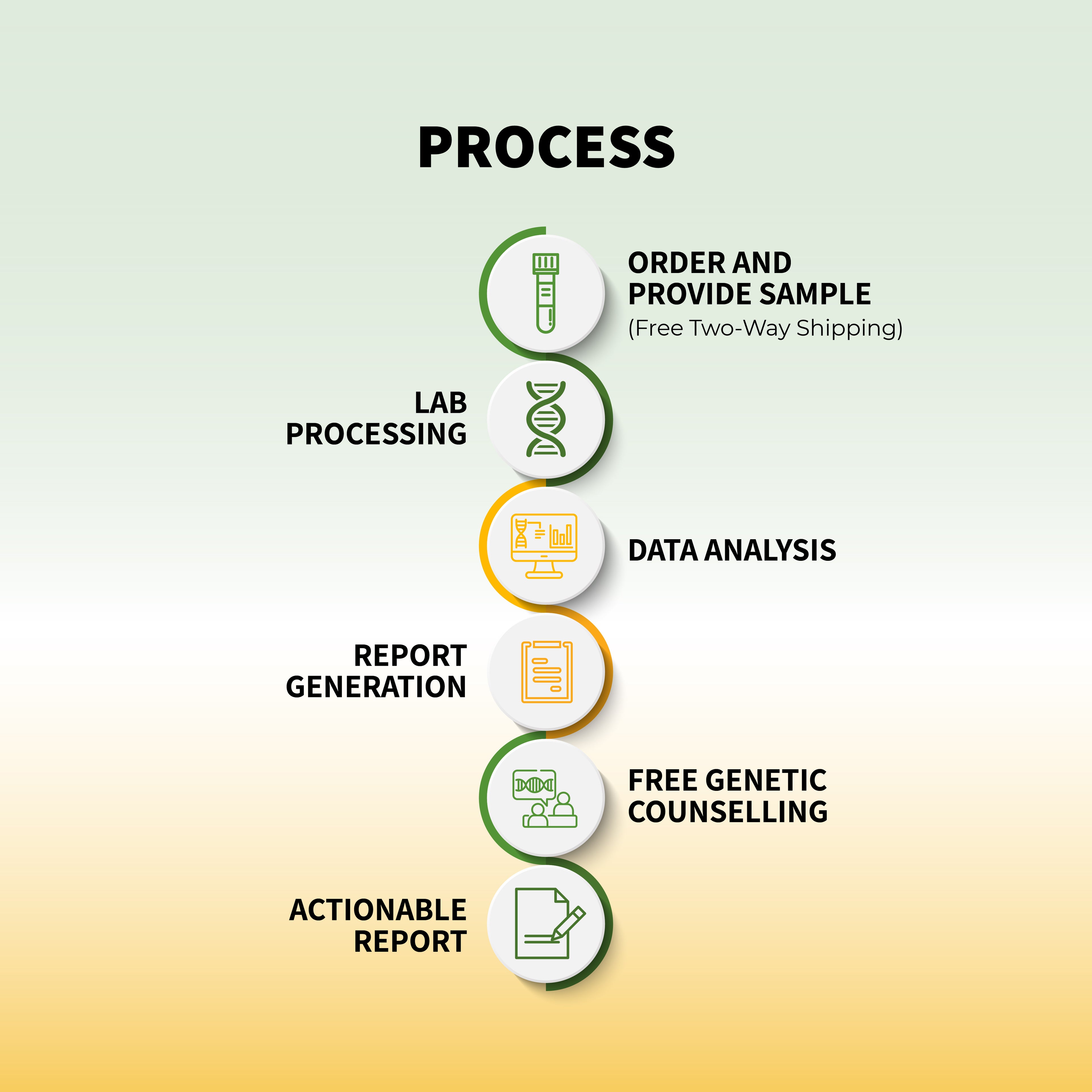आनुवंशिक विकार भयावह और भ्रमित करने वाले लग सकते हैं, खासकर तब जब "इलाज" शब्द पर सवाल उठता है। बहुत से लोग सोचते हैं कि क्या आनुवंशिक स्थितियाँ ठीक हो सकती हैं या क्या चिकित्सा अनुसंधान में प्रगति भविष्य में संभावित इलाज की ओर ले जा सकती है। इस लेख में, हम विस्तार से बताएंगे कि आनुवंशिक विकार क्या हैं, क्या उनका इलाज या उपचार किया जा सकता है, और कैसे आनुवंशिक परीक्षण और निवारक उपाय आपको स्वास्थ्य जोखिमों के प्रबंधन में सशक्त बना सकते हैं।
आनुवंशिक विकार क्या हैं?
आनुवंशिक विकार स्वास्थ्य संबंधी ऐसी स्थितियाँ हैं जो डीएनए में परिवर्तन या उत्परिवर्तन के कारण होती हैं। ये उत्परिवर्तन कोशिकाओं और अंगों के सामान्य कार्यों को बाधित कर सकते हैं, जिससे विभिन्न स्वास्थ्य समस्याएँ हो सकती हैं। आनुवंशिक विकार अक्सर तीन मुख्य श्रेणियों में आते हैं:
- एकल-जीन विकार - एकल जीन में उत्परिवर्तन के कारण (जैसे, सिस्टिक फाइब्रोसिस, सिकल सेल एनीमिया)।
- गुणसूत्र संबंधी विकार - गुणसूत्रों में परिवर्तन के कारण होते हैं, जैसे डाउन सिंड्रोम में एक अतिरिक्त गुणसूत्र होना।
- जटिल विकार - इसमें कई जीनों में उत्परिवर्तन शामिल होते हैं, जो अक्सर पर्यावरणीय कारकों (जैसे, मधुमेह, हृदय रोग) से प्रभावित होते हैं।
क्या आनुवंशिक विकार उपचार योग्य हैं?
इसका सरल उत्तर है: यह विकार पर निर्भर करता है । जबकि कुछ आनुवंशिक स्थितियों को उपचारों से प्रबंधित या सुधारा जा सकता है, अधिकांश आनुवंशिक विकार पारंपरिक अर्थों में "उपचार योग्य" नहीं हैं। यहाँ कारण बताया गया है:
1. आजीवन डीएनए में परिवर्तन
आनुवंशिक विकार डीएनए में स्थायी परिवर्तन से उत्पन्न होते हैं, जो शरीर की हर कोशिका में मौजूद होता है। इस डीएनए को बदलना, विशेष रूप से इस तरह से कि यह हर प्रभावित कोशिका तक पहुँच सके, वर्तमान तकनीक के साथ चुनौतीपूर्ण है।
2. उपलब्ध उपचार बनाम इलाज
चिकित्सा विज्ञान ने ऐसे उपचार विकसित किए हैं जो लक्षणों को प्रबंधित करने या कुछ आनुवंशिक विकारों की प्रगति को धीमा करने में मदद कर सकते हैं। उदाहरण के लिए:
- हीमोफीलिया के रोगियों को थक्का बनाने वाले कारक का इंजेक्शन दिया जा सकता है।
- सिस्टिक फाइब्रोसिस के उपचार में एंटीबायोटिक्स, श्वसन चिकित्सा और आहार समायोजन शामिल हो सकते हैं। हालाँकि, ये उपचार विकार के अंतर्निहित कारण को ठीक करने के बजाय लक्षण प्रबंधन पर ध्यान केंद्रित करते हैं।
आनुवंशिक अनुसंधान में प्रगति और संभावित भविष्य के उपचार
जबकि वास्तविक "इलाज" अभी भी दुर्लभ हैं, आनुवंशिकी में चिकित्सा अनुसंधान ने महत्वपूर्ण प्रगति की है। नीचे आनुवंशिक अनुसंधान में कुछ आशाजनक प्रगति दी गई है जो संभावित इलाज को वास्तविकता के करीब ला सकती है:
1. जीन थेरेपी
जीन थेरेपी का उद्देश्य दोषपूर्ण जीन को स्वस्थ जीन से बदलना है। यह अभी भी एक प्रायोगिक उपचार है, लेकिन शुरुआती सफलताएँ आशा प्रदान करती हैं। उदाहरण के लिए:
- जीन थेरेपी उपचार के माध्यम से स्पाइनल मस्कुलर अट्रोफी (एसएमए) के रोगियों में सुधार देखा गया है।
- शोधकर्ता सिकल सेल एनीमिया के लिए जीन थेरेपी की खोज कर रहे हैं, तथा नैदानिक परीक्षणों में उन्हें कुछ सफलता भी मिली है।
2. CRISPR-Cas9 जीन संपादन
CRISPR तकनीक वैज्ञानिकों को डीएनए को “संपादित” करने की अनुमति देती है, जो संभावित रूप से कुछ आनुवंशिक विकारों के लिए जिम्मेदार उत्परिवर्तन को ठीक करती है। CRISPR अभी भी अपने शुरुआती चरण में है, लेकिन इसने नियंत्रित परिस्थितियों में रक्त विकारों और कुछ वंशानुगत स्थितियों के उपचार में आशाजनक परिणाम दिखाए हैं।
3. स्टेम सेल थेरेपी
स्टेम सेल थेरेपी में क्षतिग्रस्त या खराब कोशिकाओं को बदलने के लिए स्टेम सेल का उपयोग करना शामिल है। इस पद्धति ने ल्यूकेमिया और लिम्फोमा जैसे विकारों में आशाजनक परिणाम दिखाए हैं, हालांकि अन्य आनुवंशिक रोगों के लिए अनुसंधान जारी है।
4. लक्षित औषधि उपचार
अब लक्षित दवाएँ विकसित की जा रही हैं जो विशिष्ट आनुवंशिक उत्परिवर्तनों को संबोधित करती हैं। उदाहरण के लिए:
- ट्रिकाफ्टा एक दवा है जिसे सिस्टिक फाइब्रोसिस में कुछ उत्परिवर्तनों के लिए अनुमोदित किया गया है, जो उन रोगियों के फेफड़ों की कार्यक्षमता और जीवन की गुणवत्ता में सुधार करता है।
- नई कैंसर दवाएं विशिष्ट आनुवंशिक उत्परिवर्तनों को लक्षित करती हैं, जिससे व्यक्तिगत कैंसर उपचार संभव हो जाता है।
इन उपचारों को अभी और अधिक शोध तथा विनियामक अनुमोदन की आवश्यकता है, लेकिन वे आशा की एक झलक प्रदान करते हैं कि आनुवंशिक उपचार किसी दिन वास्तविकता बन सकते हैं।
आनुवंशिक परीक्षण कैसे मदद कर सकता है
हालाँकि आनुवंशिक विकार अभी तक पूरी तरह से ठीक नहीं हो सकते हैं, लेकिन आनुवंशिक परीक्षण आपको अपने स्वास्थ्य की जिम्मेदारी लेने में सक्षम बना सकते हैं। यहाँ बताया गया है कि आनुवंशिक परीक्षण से आपको क्या लाभ होता है:
1. आनुवंशिक जोखिम कारकों की पहचान करना
आनुवंशिक परीक्षण से कुछ स्थितियों के प्रति पूर्वाग्रहों का पता लगाया जा सकता है, जिससे शुरुआती हस्तक्षेप संभव हो सकता है। उदाहरण के लिए, BRCA जीन परीक्षण स्तन और डिम्बग्रंथि के कैंसर के जोखिम की पहचान करने में मदद कर सकता है।
2. उपचार योजनाओं का मार्गदर्शन करना
आनुवंशिक परीक्षण के परिणाम डॉक्टरों को किसी व्यक्ति की विशिष्ट आनुवंशिक संरचना के आधार पर उपचार को अनुकूलित करने में मदद करते हैं। व्यक्तिगत चिकित्सा के रूप में जाना जाने वाला यह दृष्टिकोण उपचार की प्रभावशीलता में सुधार कर सकता है।
3. परिवार नियोजन
आनुवंशिक परीक्षण परिवार नियोजन पर विचार करने वाले जोड़ों के लिए उपयोगी है। वाहक स्क्रीनिंग माता-पिता को यह निर्धारित करने में मदद करती है कि उनके बच्चों को आनुवंशिक स्थितियाँ होने की संभावना है या नहीं।
4. निवारक देखभाल को प्रोत्साहित करना
आनुवंशिक प्रवृत्ति के बारे में जानने से जीवनशैली में बदलाव करने में मदद मिल सकती है, जिससे कुछ स्थितियों के विकसित होने की संभावना कम हो जाती है। उदाहरण के लिए, जिन लोगों के परिवार में हृदय संबंधी बीमारी का इतिहास है, वे शुरू से ही हृदय-स्वस्थ आदतें अपना सकते हैं।
आनुवंशिक विकारों का प्रबंधन: मुख्य सुझाव
यदि आप या आपके किसी प्रियजन को कोई आनुवंशिक विकार है, तो यहां कुछ कार्यवाही योग्य कदम दिए गए हैं जिन पर विचार किया जा सकता है:
1. एक जानकार चिकित्सा टीम बनाएं
आनुवंशिक विकारों में अनुभवी स्वास्थ्य सेवा प्रदाताओं, जैसे आनुवंशिक परामर्शदाताओं, विशेषज्ञों और सहायता संगठनों की तलाश करें।
2. लक्षण प्रबंधन पर ध्यान दें
नियमित जांच, दवाएं और उपचार लक्षणों को प्रभावी ढंग से प्रबंधित करने में मदद कर सकते हैं, भले ही इलाज उपलब्ध न हो।
3. क्लिनिकल परीक्षणों का अन्वेषण करें
कई नैदानिक परीक्षण आनुवंशिक विकारों के लिए नए उपचारों पर ध्यान केंद्रित करते हैं। अपने डॉक्टर से पूछें कि क्या आप भाग लेने के योग्य हैं, क्योंकि ये परीक्षण नवीनतम उपचारों तक पहुँच प्रदान करते हैं।
4. जीवनशैली में बदलाव पर विचार करें
पोषण, व्यायाम, तनाव प्रबंधन और पर्यावरणीय ट्रिगर्स से बचना समग्र स्वास्थ्य को बढ़ावा दे सकता है और कुछ आनुवंशिक विकार लक्षणों के प्रबंधन में मदद कर सकता है।
आनुवंशिक विकारों के बारे में अक्सर पूछे जाने वाले प्रश्न
प्रश्न 1. क्या आनुवंशिक विकारों को रोका जा सकता है?
यद्यपि आप अपनी आनुवंशिकी को बदल नहीं सकते, फिर भी जीवनशैली में समायोजन और निवारक देखभाल से कुछ आनुवंशिक विकारों, विशेष रूप से हृदय रोग जैसे जटिल विकारों से जुड़े जोखिम कारकों को प्रबंधित करने में मदद मिल सकती है।
प्रश्न 2. क्या आज आनुवंशिक विकारों का कोई इलाज उपलब्ध है?
अधिकांश आनुवंशिक विकार पारंपरिक अर्थों में उपचार योग्य नहीं हैं, लेकिन जीन थेरेपी, स्टेम सेल थेरेपी और CRISPR तकनीक जैसे उपचार भविष्य में विशिष्ट स्थितियों के प्रबंधन या संभावित रूप से उलटने की आशा प्रदान करते हैं।
प्रश्न 3. क्या जन्म से पहले आनुवंशिक विकारों का पता लगाया जा सकता है?
हां, प्रसवपूर्व आनुवंशिक जांच से भ्रूण में कुछ स्थितियों का पता लगाया जा सकता है। उदाहरण के लिए, डाउन सिंड्रोम जैसे गुणसूत्र संबंधी विकारों की अक्सर शुरुआती अवस्था में ही पहचान की जा सकती है।
प्रश्न 4. क्या आनुवंशिक परीक्षण सभी के लिए आवश्यक है?
आनुवंशिक परीक्षण हर किसी के लिए ज़रूरी नहीं है। यह उन लोगों के लिए विशेष रूप से उपयोगी है जिनके परिवार में आनुवंशिक विकारों का इतिहास है, परिवार की योजना बना रहे व्यक्ति या जो लोग आनुवंशिक प्रवृत्तियों के आधार पर अपनी स्वास्थ्य योजनाएँ बनाना चाहते हैं।
प्रश्न 5. मुझे कैसे पता चलेगा कि मैं किसी आनुवंशिक विकार का वाहक हूं?
कैरियर स्क्रीनिंग से यह पता लगाया जा सकता है कि क्या आपमें कुछ खास बीमारियों के लिए जीन उत्परिवर्तन है, भले ही आपमें लक्षण न दिखें। यह उन व्यक्तियों या जोड़ों के लिए विशेष रूप से उपयोगी है जिनके परिवार में आनुवंशिक बीमारियों का इतिहास रहा हो।
निष्कर्ष
हालांकि आनुवंशिक विकारों का इलाज अभी तक संभव नहीं है, लेकिन आनुवंशिक शोध में प्रगति से इसमें संभावित रूप से बदलाव आने की संभावना है। आज, आनुवंशिक विकारों के उपचार में सुधार जारी है, जिससे रोगियों को बेहतर जीवन स्तर मिल रहा है। इस बीच, आनुवंशिक परीक्षण आपको सक्रिय स्वास्थ्य विकल्प बनाने, संभावित जोखिमों को समझने और आत्मविश्वास के साथ भविष्य की योजना बनाने में सक्षम बनाता है।
सही जानकारी, स्वास्थ्य सेवा टीम और सहायता के साथ, आनुवंशिक विकार का प्रबंधन करना या अपनी आनुवंशिक प्रवृत्तियों को समझना कम कठिन हो सकता है। जैसे-जैसे विज्ञान आगे बढ़ रहा है, आनुवंशिक परीक्षण और नई चिकित्सा जैसे विकल्पों के बारे में जानकारी रखना सुनिश्चित करता है कि आप भविष्य में आने वाली किसी भी स्थिति के लिए तैयार हैं।















